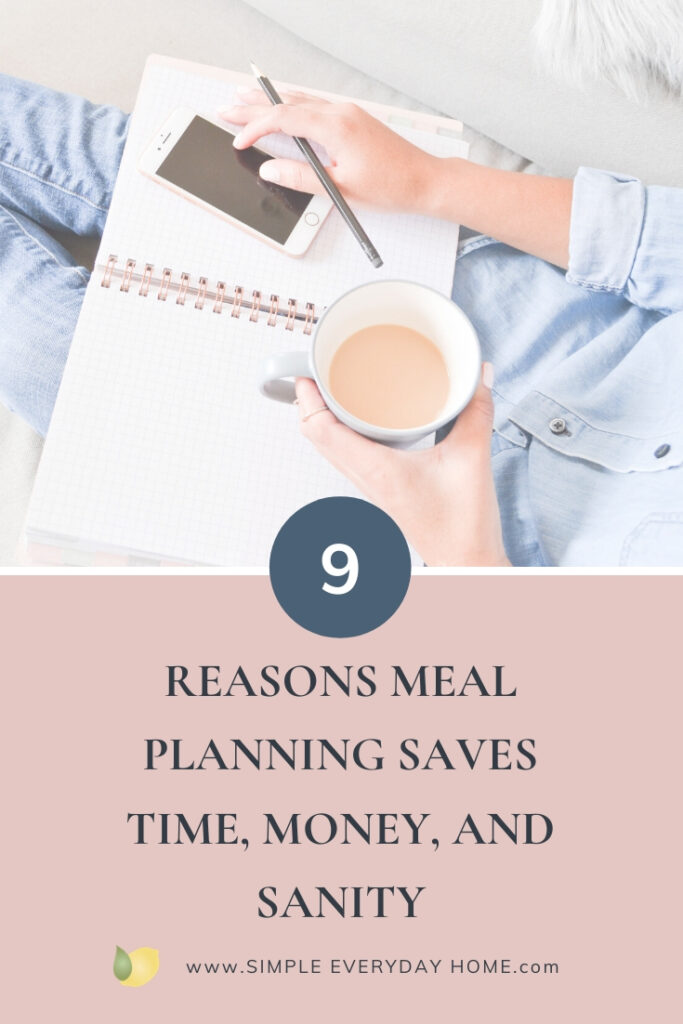9 Reasons Meal Planning Saves You Time, Money, and Sanity
Meal planning is essential for saving money on food, but it’s also an important time and sanity-saver. Plus you’ll eat healthier and always have an answer to dreaded question of “what’s for dinner?”
Okay. It’s confession time.
I really don’t enjoy meal planning.
There. I said it.
Before I start talking all about meal planning (and acting like I’m a meal-planning-rock-star), I thought you should know that it isn’t something I like. It’s something I do because I need to. It’s a “must-do” not a “want-to-do” for me.
Sometimes, I feel the same way about making dinner, too. I love to cook, but not so much at the end of the day. Or after a baseball game when I really wish the kids were in bed instead of circling the kitchen like vultures. Much of the time, I’d rather order a pizza.

I just don’t want you to think that menu planning is something only perfect people do. The fact that I do it sort of shoots down that theory. Planning meals ahead of time actually helps cover up some of my imperfections. It makes me look a little more put-together than I really am.
I’ve been meal planning for a long time. A really long time. Like, since baggy jeans were in style. The first time.
But at the beginning of my marriage, I didn’t do any meal planning.
I also didn’t go much cooking.
Or laundry.
Or dusting and vacuuming.
Ahhh….those were the days….
I suppose it was after we had a kid and started spending more time at home that I began to plan our meals each week. We didn’t have any extra money to spare, and I needed to know the exact items to buy at the store so I didn’t waste a single penny.
Well, it’s eighty-three years later (give or take a few years), and I’m still planning. There are lots of reasons why I menu plan, and it’s become one of the most valuable tasks I do.

Here are some very good reasons to meal plan….
1. It saves you money.
It certainly helps save money on food by keeping you from buying unnecessary groceries, and even more importantly, it helps you not step foot inside the store mid-week. Because seriously, what self-respecting woman can walk into a grocery store and leave with just the one item she went in for!?
2. It makes you more efficient, which also saves money.
When you make a plan that uses the food that’s already in the freezer, fridge, and pantry, that means fewer items on the shopping list and less food being purchased or wasted. You can plan for how to use leftovers and also make sure you have a way to use up all the produce and other perishables that can easily end up in the trash.
Get your FREE Simple Decluttering Cheatsheet!
Start feeling at peace in your own home! Learn how to pick the best spot to start decluttering AND step-by-step how to tackle the mess in any room in your house. PLUS get my best tips right in your inbox…and it’s 100% FREEEEE!
Your email is safe with us. We wouldn’t dream of sharing it with anyone else!
“I keep every email you send out. You are so spot on with your advice.” – MaryLou
3. It saves you from thinking.
The thought process involved in gazing into the refrigerator and trying to imagine what meal you can make from its random contents is downright exhausting. And having to do that every single day is a bit stressful, to say the least. Taking a few minutes once a week to do all the thinking and planning will save untold brain cells (and eliminate a whole bunch of anxiety, too).
4. It allows you; to plan around crazy schedules.
Planning your menu ahead of time gives you the chance to glance at what’s on the calendar and write in meals that will fit the time and energy you’ll have for cooking each day. You’ll know which night needs a quick and easy meal and what days you can have a nice family dinner.
5. It keeps you away from fast food or take-out (another money saver).
As tempting as it is to grab dinner out, your meal plan calls you back home empty-handed. I can’t count how many times I’ve begged myself to just order a pizza (or throw a frozen one in the oven), only to see my demanding menu hanging on the side of the fridge. Basically, it helps keep your wallet (and your waistline) out of trouble.
6. It makes you healthier.
Writing out a menu gives you the chance to plan some sort of veggies into your meals. It also gives you the opportunity to plan for healthier proteins, fewer carbs, more natural ingredients, or whatever else may be important to you. If it’s on the plan, you’re much more likely to actually incorporate those healthy choices into your life.
7. It opens the door to variety.
Just like planning ahead encourages healthier eating, it also encourages you to avoid serving plain old chicken breast every day or six different recipes for pasta in a single week. It gives you the opportunity to look at your week as a whole and create a balanced plan. You may even be inspired to schedule in some of those recipes you’ve been tearing out of magazines and saving to a Pinterest board (how fun!).
8. It tells you what you need to do.
Since you know what’s for dinner, you’ll know what you should do ahead of time to be prepared. You can thaw out meat, make some chicken stock, or mix up the bread when you have a few extra minutes in your day. No more waiting until the last minute, only to discover that you’ve run out of time and have to order a pizza instead.
9. It gives you an easy answer when the kids say, “What’s for dinner?”
Am I the only one whose kids ask that question several times every day? With your meal plan written out and hanging in the kitchen, you no longer have to dread that daily (hourly?) question. As a matter of fact, your family may actually enjoy being able to see for themselves what’s for dinner so they don’t have to ask that question anymore at all. Hallelujah, am I right!?
How to Make Meal Planning Work for You:
My “system” for menu planning is pretty basic. It should only take a few minutes each time, and the more you do it, the easier it will become. And it doesn’t matter if you plan for one week (what I usually do), one month (what I wish I did), an entire season, or something in between. The keys to success are still the same.
1. Make a list of possible meals.
In your planner or on the side of the fridge, have a list of meals that your family likes to eat (and you don’t mind making).
- Write down various types of meat dishes (ie. chicken, beef, pork, etc.)
- Write down favorites in various kinds of cuisine (ie. Mexican, pasta, soups, etc.)
- Write down quick and easy meals (ie. burgers, sandwiches, mac & cheese, etc.)
- Write down prep ahead meals (ie. slow cooker recipes, leftover remakes, etc.)
- Write down special meals and family favorites (ie. pizza, pot roast, etc.)
2. Schedule the week’s meals to specific days.
Depending on your personality and your family’s schedule, you may be happy to simply post the list of meals you can make that week and casually glance at it each morning to choose what’s for dinner. However, quite often it’s best to plan out what you’ll serve on which days, if for no other reason than to help you stick to using your meal plan (instead of your credit card for take-out).
For scheduling your menu, you can use an actual calendar, a phone app, your daily planner, or even a piece of paper with the days listed down the side.
- Plug in any meals that are needed on a particular day or for a special occasion (birthdays, weekends, dinner guests, etc.).
- Assign easy meals to busy days.
- Fill in the blanks with the rest of the meals, keeping that week’s scheduled activities in mind.
- Tweak or rearrange, as needed. Be sure it makes sense (ie. the meatball subs are scheduled two days after spaghetti-and-meatballs).
3. Follow the plan, but don’t be too rigid.
Remember that your meal plan is just a plan, not a set of rules written in stone. It’s a tool to use however it best serves your family. For example, if your evening is unexpectedly interrupted by a late ballgame or your husband surprises you by bringing home a stack of pizzas, then make whatever changes are needed to enjoy dinner with your family. It can be helpful to have a couple of ideas for back-up meals, too, just in case a day totally falls apart.
By having a flexible meal plan, you’ll avoid getting stressed out if things get a little off track and you’ll be able to save money and your sanity no matter what comes your way!
Get your FREE Simple Decluttering Cheatsheet!
Start feeling at peace in your own home! Learn how to pick the best spot to start decluttering AND step-by-step how to tackle the mess in any room in your house. PLUS get my best tips right in your inbox…and it’s 100% FREEEEE!
Your email is safe with us. We wouldn’t dream of sharing it with anyone else!
“You should see my house right now. Thank you so much for everything!!” – Carly









There is something else I keep in mind when I’m meal planning. I want to stick to a somewhat healthy meal plan and that means that I can’t have only meat dishes in my meal plan. So, I have made up a “rule” that was inspired by my Greek upbringing. During the week I need to meal plan one chicken dish, one red meat dish (which usually means pork), one fish dish (that is a must), one legume recipe, two ladera (it’s a category of Greek dishes that are rich in olive oil and are mostly vegetarian of not vegan) and then I have one day when I am free to choose whatever I feel like maybe pasta or a homemade pizza or anything I might have missed. It’s a great way to keep myself in check
I love this! What a great way to plan for variety, as well as health-conscious meals!
Wait. You got married eighty-three years ago? How how are you?
Haha! Just trying to add a little humor.😉 I’ve been married for twenty-seven years.🙂